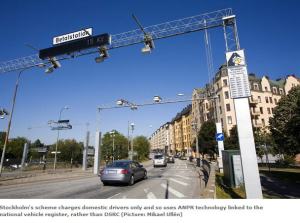--> Read on:
Wednesday, February 27, 2013
Tuesday, February 26, 2013
Wednesday, February 20, 2013
Program Announcement: World Carshare 2013 Policy/Strategies Program for Local Government

Carsharing has a brilliant, in many ways surprising and certainly very different future -- a future which is already well in process. Carsharing is one of the fastest growing new mobility modes, with until now almost all services occurring in the high income countries. But it is by and large new, unfamiliar and does not fit well with the more traditional planning and policy structures at the level of the city. This is a problem. And addressing this problem is the goal of this cycle of reports and events in the year ahead.
Tuesday, February 19, 2013
Planetary Boundaries and Low Carbon Urban Mobility
Useful presentation and overview of the issues and trends by Professor David Banister (University of Oxford) in a three part series "The Future of Sustainable Mobility". The following introduces his presentation but for the full text please click here.
Saturday, February 16, 2013
Thursday, February 14, 2013
Support for women and leadership in transport. This time from Hong Kong.
The latest news about increasing support of women in leadership positions in transport just in this morning from Hong Kong.
World Streets is firmly behind the movement to bring more women at all levels of society and in all countries into the heart of the process of understanding, planning and implementing fair mobility for all. Since 1973 the editor has been actively engaged in the movement to increase the role of women in the highest levels of leadership in public, private sectors and into the volunteer and NGO movement. At times this has been a lonely vigil, but as the French poet Louis Aragon told us some two generations ago: "La femme est l’avenir de l’homme" (Woman is the future of man). If you believe that, it makes you very hard to stop.
Tuesday, February 12, 2013
Can you judge a city by its street furniture?

Street furniture. Put it like that and it sounds a bit banal, like a detail. A choice that may or may not seem to be of much important. Not really "necessary" and perhaps even an unaffordabel luxury for a city at a time of limited budgets. But good street furniture -- and even more great street furniture -- is a sign of a city that cares. A public space, public comfort project that anyone can use without having to pay a dime. And with it we suddenly are moving into a new social space.
Sunday, February 10, 2013
Seven wishes from World Streets for China in the Year of the Snake
 Gong Xi Fa Cai Transport in Cities:
Gong Xi Fa Cai Transport in Cities:
May the Year of the Snake be the year in which China no longer follows the old tired paths of the twentieth century, but shows the world new ways to tackle city mobility improvement with striking on-street examples of affordable and efficient ways to move into a new era of harmony and transportation with a human face.
 Here are our seven wishes for efficiency, harmony and mobility in Chinese cities in this Year of the Snake.
--> Read on:
Here are our seven wishes for efficiency, harmony and mobility in Chinese cities in this Year of the Snake.
--> Read on:
Friday, February 8, 2013
Current conditions for cycling STOP Britain cycling!!!
 Transport in cities is a steep uphill affair. If we ever are to transform the quality of the mobility arrangements in our cities, there are certain basic truths about it that need to be repeated again and again. By different people, in different places and in different ways. Until we win.
Transport in cities is a steep uphill affair. If we ever are to transform the quality of the mobility arrangements in our cities, there are certain basic truths about it that need to be repeated again and again. By different people, in different places and in different ways. Until we win.
Cycling in most cities: You and I know it. It is broke. It cannot be "fixed". It needs to be reinvented from the street up. All of which is easy enough to say, but what in concrete terms does that mean? This article which appeared in the Guardian a few days back by Peter Walker, reports on the testimony of Dave Horton a cycling sociologist who pounds the table on five basic truths of cycling in cities.
Thursday, February 7, 2013
Congestion Pricing: Neoliberal approaches and their results in three world cities
In 2013 we shall be giving quite a lot of attention to congestion pricing or  charging by its many names and variants, all of which sharing the goal of finding ways to make drivers pay for entry and use of a scarce resource, road space in city centers . This fascinating article by Themis Chronopoulos which is introduced here takes quite an original point of view in his thorough analysis of three of the most recent and widely followed projects (or in the case of New York City, would-be project). (Note: A quick search of Google this morning called up some 4,370,000 references under the single term of congestion pricing. Something must be going on.)
charging by its many names and variants, all of which sharing the goal of finding ways to make drivers pay for entry and use of a scarce resource, road space in city centers . This fascinating article by Themis Chronopoulos which is introduced here takes quite an original point of view in his thorough analysis of three of the most recent and widely followed projects (or in the case of New York City, would-be project). (Note: A quick search of Google this morning called up some 4,370,000 references under the single term of congestion pricing. Something must be going on.)
Tuesday, February 5, 2013
Driverless cars: There they go again
This fine common sense article by Ron Kilcoyne, an expert on pubic transportation  from Eugene Oregon, appeared a few days ago in Jarrett Walker's blog, Human Transit. The lively Walker blog is giving space to articles and reader comments on this latest technology star candidate which is being touted energetically as a cure to a very long list of things. Well, maybe. Let me get out of the way and let Ron Kilcoyne tell you what his view is on this latest bit of techno-excitement.
from Eugene Oregon, appeared a few days ago in Jarrett Walker's blog, Human Transit. The lively Walker blog is giving space to articles and reader comments on this latest technology star candidate which is being touted energetically as a cure to a very long list of things. Well, maybe. Let me get out of the way and let Ron Kilcoyne tell you what his view is on this latest bit of techno-excitement.
Monday, February 4, 2013
Op-Ed: Zurich's Parking Revolution
Parking policy and practice in a city is a marker, a litmus test of its collective  commitment to an efficient and beautiful city. More than that, the policy has to be carefully thought out, agilely negotiated and executed with long-term commitment. Stop-and-start policies in such important areas are the mark of political immaturity. So if your city does NOT have such a policy, and is NOT applying it with continuity and consistency, then sorry to say you are far from the front rank of sustainable cities.
commitment to an efficient and beautiful city. More than that, the policy has to be carefully thought out, agilely negotiated and executed with long-term commitment. Stop-and-start policies in such important areas are the mark of political immaturity. So if your city does NOT have such a policy, and is NOT applying it with continuity and consistency, then sorry to say you are far from the front rank of sustainable cities.
It's a choice, a political choice, not only of those public servants and elected officials who are during their term responsible for transport, public space and life quality matters in the city, but above all, and ultimately far more important, the citizenry. The active citizenry. So with that behind us, let's see what the fresh eyes of a visiting American academic and transportation engineer spotted and have to say about parking policy and performance in the beautiful city of Zürich. 
Saturday, February 2, 2013
The future of the car in the city: Vol. 1., No. 1. Carsharing Policy Guide for local government
 Dear Reader,
Dear Reader,
The future of the car in the city is morphing fast and is going to be very different from the suddenly long gone 20th century. But this we here are all well aware of. After all we have been swapping information and insights on these issues and challenging each other for more than a decade on a number of New Mobility fora.
Today we want to share some information with you on a new collaborative project that is just forming up, namely to create an expert guide for mayors and local government specifically in the field of carsharing.




